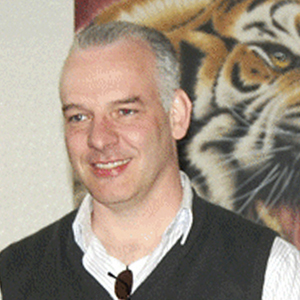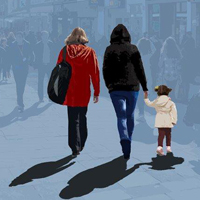With its clear turquoise waters, white sandy beach and picturesque cliffs, it is easy to see how Praia da Luz became a popular holiday destination.
It is still strangely peaceful, despite the crowds of tourists. The soundscape is dominated by the crashing of waves along the shore, with just a low background hum of conversations in multiple languages.
Young families are dotted across the hot sands of the beach, while older couples sit at cafe tables and chairs lining the promenade.
An accordion player says "obrigado" as people strolling by drop Euros into his instrument case, while further down, young boys dare each other to dive off the rocks.

The "Find Maddie" posters, that once were pasted up everywhere around the former fishing village, have long since been torn down.
The only physical remnants of the extensive search for Madeleine - and the saturated media coverage - are 'Stop' traffic signs, graffitied so they now read: "Stop McCann Circus".

At the Ice Cream Factory, one of the busiest shops near the seafront, tourists queue up under the blue and white striped awning.
A toddler in a pushchair uses his chubby hands to grasp a chocolate ice cream almost as big as his head, while his father pays the Portuguese woman serving behind the counter.
She's extremely friendly and takes her time to chat with each customer, offering them free samples of different flavours and asking about their holidays.

As soon as she is asked about Madeleine McCann, though, her mood abruptly changes and she swears.
"I'm sorry, enough is enough," she spits out. "I've had enough. There are thousands of kids who disappear and nobody cares. What's the difference? Are they special?
"They went to the Pope - come on!" she adds, referring to the visit by Madeleine's parents, Kate and Gerry McCann, to Pope Benedict XVI.

It seems everyone in the resort is desperate to move on from Madeleine. But despite the bright sunshine and relaxed holiday atmosphere, the shadow of her story lingers.
The woman selling ice cream has only lived in Luz for three years but she remembers Madeleine's disappearance well - because of the media coverage.
As a mother herself, and having previously worked as a babysitter, she is critical of Madeleine's parents for leaving their child in the apartment while they dined nearby with friends.
"Horrible, horrible, and they have money," she says. "Rich, rich, rich people, come on. They could pay like 10 babysitters. What the hell?"
Countless local people helped search for Madeleine when she was reported missing, but now it is difficult to find anyone in Luz who sympathises with her parents.
They make the same point, over and over again - Portuguese culture is strongly family-focused and parents there would never have left their children alone.
We do get a lot of people asking 'Where is the place that Maddie disappeared?"
Jessica Geislinger, who works in a seafront cafe, was 18 when Madeleine disappeared.
"I remember a lot of Portuguese getting up, going out in the fields, trying to do everything for this family, to help this family find this little girl," she says.
She now has two children of her own and feels Luz is a very safe place for them. "We Portuguese believe there are problems with the parents, it was their fault, neglecting the children by not leaving anyone behind looking after them," she says.

Jessica Geislinger feels Luz is a very safe place
"We do get a lot of people asking 'Where is the place that Maddie disappeared?' We have to show them on maps a lot of times."
Luz does not have the tacky souvenir shops that many British seaside resorts are littered with, but there is a small scattering of stalls along the promenade.
They are cluttered with cheap souvenirs, such as knock-off Banksy prints, scarves, windchimes and woven friendship bracelets spelling out "Arsenal" and "Man Utd".
Ana Faria was running one of these stalls at the time Madeleine disappeared, and still works there now.

Ana Faria said the local economy had suffered
"I think every, single, local, person, was looking for her," she recalls, pausing after each word for emphasis.
"At that moment I thought she was taken or abducted... but when the investigation went further there were many things not fitting together.
"Still we haven't found the body so until that's done we cannot say what happened. I hope she's still alive. If she's alive we celebrate."
Sorry, but I have to say it. We have to pay the price for somebody else's problems"
The disappearance of Madeleine and the media spotlight that followed are blamed by many in Luz for a drop in visitor numbers in ensuing years.
"That summer was totally rubbish and then the following seasons were also very weak and nobody can do anything about it," adds Ana.
"It's really unfair because I was not the one that left her alone at home. Sorry, but I have to say it. We have to pay the price for somebody else's problems."
Every resident you speak to in Luz repeats the same mantra - the area is safe for children. In fact, many find it hard to believe Madeleine was abducted.
As one English restaurant owner, who has lived in Luz for the past 26 years, says: "Everybody has got their own opinion about what happened but I, pfff, I could never imagine anybody walking in and taking a child.
"It just doesn't seem feasible because it's such a safe place for kids. You used to see kids playing out on the streets, if anybody wanted to take one they could have took one. Why go in an apartment thinking they might be caught?"

Despite Madeleine's disappearance, the area is still incredibly popular with British holidaymakers. They make up the majority of tourists in Luz and 1.1 million British tourists visited the Algarve region in 2016.
The area's tourism officials say this was an increase of 11% on the previous year and visitor numbers to the Algarve have actually increased since Madeleine disappeared.
Among the English holidaymakers enjoying the sun is Stephen Kilby, from Driffield, Yorkshire, who is there with his girlfriend and two children.

"We know where she went missing and our apartment is about a two-minute walk away," he says, while his eight-year-old daughter Lucy buries her father's feet with sand.
His family started coming to Luz in 2014 and this is their fourth trip. Madeleine's disappearance has not deterred them and Stephen feels the area is "very, very safe".
Luz is also popular with Portuguese tourists. One of them, Felepe Barros, wanders over the rocks clutching a shot glass of limoncello.
"I believe she's dead," he says when asked about Madeleine. "It's a tragedy and we are, still today, very confused. We don't know what is the truth. But it's very sad."

Felepe Barros: "It is very sad."
His cousin, Goncalo Mesqueta, is walking down to the sea with his seven-year-old daughter Enas.
He is from Lisbon but has been holidaying here for 38 years, since he was a baby.
However, he keeps a careful watch on Enas and his other daughter, who is three.

Goncalo Mesqueta and his daughter Enas
"I've heard lots of stories, lots of theories, but I don't know what happened," he says of Madeleine.
"I believe that [abduction] can happen here or in any place.
"It's a risk everywhere, it's not particular to here, but we are also checking where our girls are because we don't know what can happen."
Along the promenade, a father from York is accompanying his son as he plays Pokemon Go.
It does send a shiver down your spine when you look across at the apartment"
The family are staying at his mother-in-law's apartment in the Ocean Club resort - from where Madeleine disappeared.
"We've been coming here every year regardless," he says. "We love it here. It's still not deterred us. It's a great little resort.
"You enjoy it, don't you?" he says to his son. "What do you like about it?"
"Just the ice creams," says his son.

He noticed a "massive drop" in the number of people visiting Luz after Madeleine's disappearance.
"It seems to be getting back to what it was now but I don't think it will fully ever get back to the amount of tourism it had before, simply because some families still choose not to come here," he says.
He believes Madeleine was abducted and says he is now more wary about letting his children out of sight.
His family use the swimming pool that is directly in front of the apartment from where Madeleine disappeared, and next to the restaurant where the McCanns were dining.
"That's where we go sunbathing, and it does send a shiver down your spine when you look across at the apartment," he says.
"You can only imagine what's happened really."
The apartment the McCanns stayed in is towards the centre of Luz, about a five-minute walk up a slight hill from the beach.
At first glance it seems no different from the hundreds of other holiday homes in Luz.
The temperature is already hitting 25C and the blinding afternoon sun bounces off the whitewashed walls of the apartment block.
Sunbathers in swimsuits sit around the swimming pool directly in front of the building while others sip cool drinks in the shade.

The courtyard of the apartment is now obscured by a hedge
There are no clues to indicate this is the infamous location where Madeleine McCann was last seen.
If the apartment stands out at all it is only because of its strange familiarity, having appeared in countless websites, newspapers and rolling TV news coverage over the past 10 years.

The streets near the Ocean Club Resort after Madeleine's disappearance
As holidaymakers amble down the hill towards the beach, it is difficult to imagine the street as it once was - swarmed by reporters, film crews and TV presenters.
The apartment is no longer let out to holidaymakers, having been bought by a British woman of retirement age. It now has thick hedges surrounding the garden, providing privacy from the road.
But still, the owner is frustrated with all of the attention.
"I've had seven film crews here in the last few weeks and I don't want to see any more," says the grey-haired woman, as she tidies her garden with a dustpan and brush.
"I just want to live my life. I don't want to speak to anybody."
As the day goes on and night falls the street becomes even quieter.
The sunbathers have left and the Garden Club bar - formerly known as the Tapas restaurant, where the McCanns and their friends dined each night - no longer opens in the evenings.

There is little reason for anyone to linger in the street, but soon, a British family drive past slowly in their Vauxhall people carrier. The dad uses one arm to point as he clutches the steering wheel with his other hand.
Suddenly he stops the car in the middle of the road, then he, his children and their mother all strain their necks to gawp through the car windows at the apartment.
About 30 seconds later he turns the car around and drives back up the street.
One of the men points at the patio doors. "This is where it happened," he says.
Half an hour later, two young men wearing shorts and T-shirts walk up the street carrying plastic bags bulging with groceries and alcohol from the nearby supermarket.
One of the men points at the patio doors, which the McCanns had left unlocked so they could make half-hourly checks on their children.
His friend lifts his head as he attempts to peer above the thick hedges surrounding the apartment.
There was once a waist-height iron gate leading into the garden but this has been replaced with a much taller one, backed by a board, preventing ghoulish sightseers from being able to see into the lounge.
"This is where it happened," says the first man.

Madeleine McCann has been missing for 10 years.
Kate McCann, in her book Madeleine, explained how she and the other parents felt the resort was safe enough to leave their children unattended in the apartments.
"This decision, one that we all made, has naturally been questioned time and time again, not least by us," she wrote.
"It goes without saying that we now bitterly regret it, and will do so until the end of our days."
Amid the McCanns' heartbreak, the media attention and the disruption to the lives of those living in Luz - it can sometimes be forgotten this is a story about a missing girl.
Madeleine McCann - described as beautiful, confident and incredibly bright by her parents - had been excited about the trip that would prove so fateful.
There are many theories about what happened to her on 3 May 2007. Still, 10 years later, her fate remains an enduring mystery.
Perhaps the only thing people can be certain of is that something horrific happened to an innocent young girl who was just short of reaching her fourth birthday.

"A beautiful child, she didn't deserve that, as any child," says Mr Rego.
"We feel - and have always felt - very, very sorry, as people, as Christians, as parents, very, very sorry for the child, for Madeleine," he adds.
"When we talk about it [in Luz] that's how we remember."
But interest in Madeleine's disappearance shows little sign of abating.
In March, the Home Office granted an extra £85,000 to extend the current British police investigation - Operation Grange - for a further six months.
In the days leading up to the anniversary, the Metropolitan Police's Assistant Commissioner Mark Rowley said a "critical" line of inquiry was still being pursued.
"I know we have a significant line of inquiry which is worth pursuing, and because it's worth pursuing it could provide an answer, but until we've gone through it I won't know whether we are going to get there or not," he said.
He also said there was still no "definitive evidence" as to whether Madeleine is alive or dead.
In Luz, the majority of people are convinced she is dead. They want the media to stop invading their village, they want tourists to continue visiting and they want the little girl who came there on holiday 10 years ago to rest in peace.

The McCanns, however, remain certain she was abducted and have expressed hope she is still alive.
In a recent interview with the BBC, Gerry McCann said: "There's no evidence that Madeleine's dead.
"No parent is going to give up on their child unless they know for certain their child's dead, and we just don’t have any evidence."
Kate McCann said: "Whilst there's no evidence to give us any negative news, that hope is still there.
"My hope of Madeleine being out there is no less than it was almost 10 years ago."
















